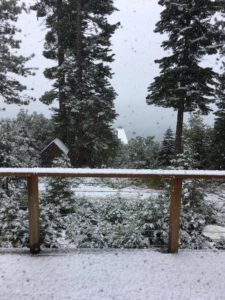
It wasn’t until late September that I was able to take any vacation this year, and going that long without a
break had left me feeling exhausted – and needing real time away from all my day-to-day activities including all email, texts and social media.
But who can do that today? Most of us routinely respond to email during vacation. Some of us go so far as to call into the office and “check in,” or dial into conference calls out of obligation. Throughout my entire career, I did all of this. But this time, I genuinely wondered, “Can I get away and truly detach?”
With a large social media presence, I initially worried I’d disappoint my followers by going AWOL. But as I thought this through, I realized they’d likely be a far more supportive than many of my past bosses would have been.
To be honest, I was also terrified by the idea of putting my phone in the drawer for seven straight days. Apple’s data shows we check our devices at least 80 times a day, and I know I bring up the average. Irresistible author, Adam Alter, says we’ve grown so addicted to technology that the average email is now answered in just six seconds! In light of all this manic dependency, my private worry was that I lacked the discipline to take the break I really needed.
Nevertheless convinced that this experiment was worthwhile – and would prove highly fulfilling if I pulled it off – I sent a message to all my clients, friends and followers, and told them I was going full monty: “With your support, I’m heading to Lake Tahoe for some R & R, and you won’t hear from me for a week.”
I was encouraged that those who chose to respond were especially positive. No one sought to persuade me that I was breaking a social contract, or that my professional reputation would take a hit. In gratitude, I set off on my trip.
As you might imagine, it was beyond torturous to not check my phone the first morning I awoke at the lake. Pacing the cabin, I started fantasizing about the bounty of overnight tweets, news and messages I was missing out on. Had my wife not securely hidden my phone, there’s no question I would have buckled. At her insistence, however, I went out for a very long bike ride, and celebrated that evening for having successfully endured day one of my “vacation.”
You might think the second morning would have been easier, but it felt like Groundhog Day when I got up. I was surely feeling all the signs of having an addiction. But on this day, it would be nature – and not my wife – that would provide the distraction I needed to keep the seduction of my iPhone in check.
In what locals would tell me was an extremely rare event, it started snowing overnight. During the week that normally launches autumn, winter arrived instead. And, for over an hour, I sipped my coffee and meditatively watched as flakes fell from the sky, landed on the pine branches and coated the ground.
And as the snow kept coming, thoughts of my phone had vanished. I built a roaring fire, grabbed one of the books I’d packed for the trip, and committed to reading it in one sitting.
It’s not a complete coincidence that I chose to read Walden by Henry David Thoreau. I knew going in that Thoreau had spent two years living in a waterside cabin, documenting the wisdom he’d gained in his great American classic.
But there surely was some serendipity in my selection. I’d owned this book for at least 25 years without flicking a page or taking it off the shelf for dusting. So why now? My conclusion is I picked the book I needed to read in that moment.
Walden was written 163 years ago, at the onset of the Industrial Revolution – the first time men were leaving farms and taking jobs in factories. Thoreau was convinced this kind of work would become soulless unless these workers routinely made time to retreat into nature for solitude and personal contemplation.
In Walden, Thoreau reminds us of the importance of staying grounded, balanced and renewed in an age that would otherwise drain us if we let it. From his own example of mindfully living alone on Walden Pond, he urged us to always keep the bigger picture of our lives in mind:
“I went to the woods because I wished to live deliberately, to front only the essential facts of life, and see if I could not learn what it had to teach, and not, when I came to die, discover that I had not lived.”
In reading, Walden, of course, I felt as if Thoreau wasn’t just giving me permission to get out of life’s current and observe my life from the shore for a while, he was insisting on it. More importantly, Thoreau understood that most of us feel compelled to stay connected to life’s incessant distractions when what we really need is time to reflect.
“It is remarkable how easily and insensibly we fall into a particular route and make a beaten path for ourselves.”
Uncharacteristically, I spent my remaining days at Lake Tahoe – often sitting on a bench at the end of the dock, inspired by Thoreau and intentionally taking everything in.
Without my phone as a diversion, I listened to the sounds of nature: water lapping onto shore, the birds singing, and the crunch of pine needles under my feet. I noticed the lichen on the trees, and watched small squirrels with amusement as they carried acorns, scurried up trees and leaped from branch to branch. There were poplar trees shining in the light, and Canadian Geese flying over the surface of the lake. In the “pastel hour” near sunset, the sky was filled every night with hues of lavender, pink and blue.
Rather than be rushed and scheduled, I let myself feel one with life. Not since I was a kid have I flowed with nature instead of trying to control it. And in the words of Thoreau, “a depth returned to my life.”
Henry David Thoreau was clearly a man of his time, but he’s also a man of ours. He understood that quietness, being in nature, and complete detachment are essential offsets to the demands of “modern day” life.
Thanks to Walden, and to my week away at Lake Tahoe, this is what I learned
We must be willing to give ourselves permission to fully disconnect from time-to-time. And as leaders, we must insist our employees get these essential moments as well.
